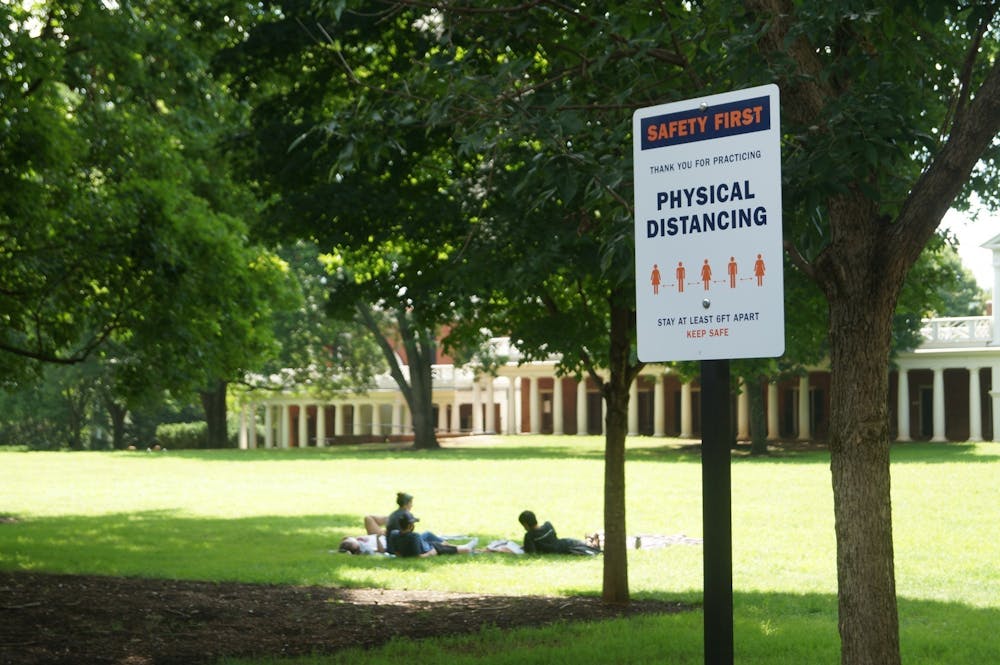The Student COVID Coalition was founded in May to provide the University with services that the coalition believed it could not fulfil without the help of students. The coalition was approved for CIO status by the Student Council Oct. 19 and currently assists with food delivery in the local community and raises money for the University’s Emergency Hiring Fund.
Jule Voss, a second-year College of Arts and Sciences student and the coalition’s executive chair, said that the coalition brought together students who were eager to help the University and local community in any way possible in wake of the pandemic.
“We wanted to help mitigate the negative effects of all of us coming back to Charlottesville whether or not classes were going to be held in person, we knew there's gonna be students in Charlottesville, we knew that our behavior would affect others,” Voss said. “So we came together to try to figure out how we could do good.”
Although the coalition was roundly criticized for potentially taking jobs away from local Charlottesville community members, Emily Bian, a third-year College student and the coalition's project committee chair for the Virginia Threads Project, said that she does not think this is the case.
“We are specifically looking for roles and niches that we can fill that students are uniquely equipped to do,“ Bian said. “There are roles that we are looking for that we are uniquely equipped to do … we are not taking away jobs from potential community members.”
In May, William Krag, a fourth-year College student and executive committee member, imagined the group would be doing jobs such as contact tracing, as well as constructing temporary buildings to create holding areas and conducting medical scans or temperature checks. Krag also proposed the coalition could be of primary use for cleaning common spaces. However, the coalition decided not to go forward with the cleaning part of their original proposition so as to not infringe on jobs that would otherwise be held by local community members.
The coalition is currently working on several initiatives that they believe will positively impact both Charlottesville and University communities alike, such as the Virginia Threads Project and the coalition’s food delivery service.
William Lloyd, a second-year College student and the coalition's project committee co-chair for the SCC Delivery Service, said that the delivery service has provided help for refugees in a local Charlottesville neighborhood. The food is delivered by students who have volunteered to help with this initiative.
“We started and continue to deliver 100 meals a week, which is about 20 per day,” Lloyd said. “We partnered with International Neighbors, which is a local nonprofit that does a lot of great work. We've also partnered with Aramark, and they've graciously provided all of those meals for free.”
The other main initiative the coalition is currently working on is the Virginia Threads Project, an operation that focuses primarily on developing and selling scarves in the University’s signature blue and orange colors to U.Va. students and faculty in hope of creating a fund to help in future pandemics or disasters, with proceeds going primarily toward the University’s Emergency Hiring Fund.
“The goals of the project are not so much to mitigate current short term effects of the pandemic, but to institute a sort of safety net that will support the University in future pandemics or times of future disasters,” Bian said. “We have 10 students working shifts this week … Moving forward, we would like to encourage and educate more people to incorporate them as volunteers as well.”
Wes Hester, deputy University spokesperson and director of media relations, said that while he was unable to provide specifics on the coalition's work thus far, the University appreciates the coalition’s initiative.
“[T]he University is thankful for all students and groups willing to lend a hand, especially during this challenging time,” Hester said. “Student Affairs is currently in conversation with this group about delivering Care Packages pulled together by students for their peers.”







